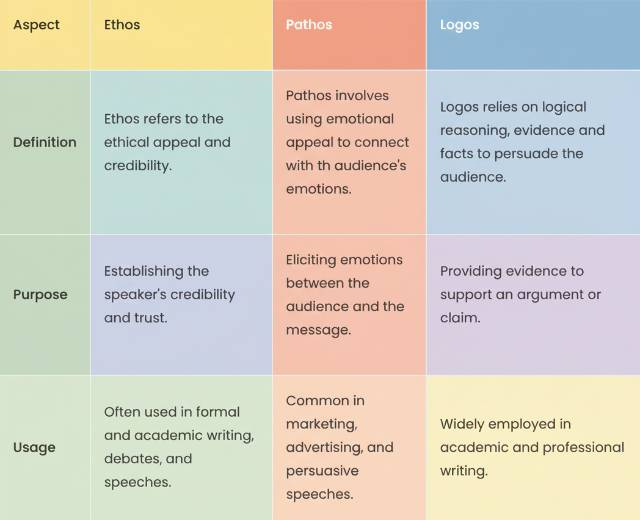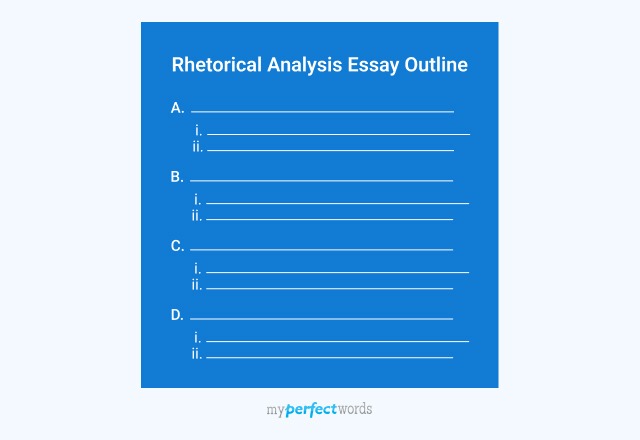Ethos, Pathos, and Logos Definition
Ethos, pathos, and logos are three essential components in rhetorical analysis. For a complete guide on writing rhetorical analysis essays, see our rhetorical analysis essay guide. It can be a very effective tool for influencing and convincing others.
These concepts have been employed by great speakers, writers, and thinkers throughout history and continue to play a pivotal role in communication today.
Here are the key differences between ethos, pathos, and logos:
Let's break down each section one at a time, getting to know what ethos, pathos, and logos mean.

Let's break down each section one at a time, getting to know what ethos, pathos, and logos mean.
Want to see these appeals in action? Check out our rhetorical analysis essay examples showing how writers identify ethos, pathos, and logos.
What is Ethos?
Ethos is all about establishing credibility and trustworthiness. When you use ethos in your argument, you aim to convince your audience that you are a credible and reliable source of information. It also means you have the expertise needed to speak on a particular subject.
This can be achieved through the use of references to your qualifications, expertise, or by citing reputable sources to support your claims.
What is Pathos?
Pathos appeals to the emotions and feelings of your audience. When you employ pathos, you're aiming to elicit an emotional response, whether it's sympathy, anger, happiness, or any other emotion that can strengthen any type of argument.
This is often achieved through storytelling, vivid language, and relatable anecdotes that connect with the audience on a personal level.
What is Logos?
Logos is the appeal to logic and reason. When you use logos, you provide your audience with clear, rational, and well-structured arguments supported by evidence, facts, and statistics.
This appeals to the logical side of your audience's thinking, encouraging them to see the soundness of your position and the validity of your claims.
Usage of Ethos, Pathos, and Logos
Understanding the definitions of ethos, pathos, and logos is a solid foundation, but knowing how to apply these modes of persuasion effectively is equally important.
In this section, we'll delve into practical examples and strategies for utilizing ethos, pathos, and logos to make your persuasive communication more compelling.
When creating your rhetorical analysis essay outline, dedicate separate body paragraphs to analyzing each appeal.
Ethos in Action
One of the most common ways to establish ethos is by citing credible sources. Whether you're writing an academic paper or delivering a persuasive speech, referencing reputable experts, institutions, or publications can lend authority to your argument.
If you have personal expertise in the subject matter, don't be shy about showcasing it. Share your qualifications, relevant experiences, or your journey of learning and growth to build trust with your audience.
The following examples of the usage of ethos in the content will help you understand the concept better.
- Political Speech: "My three decades of experience in public service, my tireless commitment to the people of this community, and my willingness to reach across the aisle and cooperate with the opposition make me the ideal candidate for your mayor."
- Business Marketing: "Our expertise in roofing contracting is evidenced not only by our 50 years in the business and our staff of qualified technicians. But in the decades of satisfied customers who have come to expect nothing but the best."
- Academic Writing: "Based on the dozens of archaeological expeditions I've made all over the world, I am confident that those potsherds are Mesopotamian in origin."
Eliciting Emotions with Pathos
Personal anecdotes or emotionally charged stories can engage your audience on a deeper level. They create a connection by allowing the audience to empathize with the characters or situations in your narrative.
Use descriptive language that paints a vivid picture in the minds of your audience. This can help evoke specific emotions and make your message more memorable.
Here are some examples of how to use pathos for persuasion:
- Political Rhetoric: "They've worked against everything we've worked so hard to build, and they don't care who gets hurt in the process. Make no mistake, they're the enemy, and they won't stop until we're all destroyed."
- Motivational Speaking: "You will never be satisfied in life if you don't seize this opportunity. Do you want to live the rest of your year’s yearning to know what would have happened if you just jumped when you had the chance?"
- Workplace Communication: "After years of this type of disrespect from your boss, countless hours wasted, and birthdays missed, it's time that you took a stand."
Logos for Logical Persuasion
Logos require you to incorporate relevant data, statistics, and evidence to support your claims. This provides a logical foundation for your argument and demonstrates that your position is well-informed and substantiated.
Using logos can be a bit hard compared to the other two devices, but the following examples can help you understand.
- Legal Arguments: "Ladies and gentlemen of the jury: we have not only the fingerprints, the lack of an alibi, a clear motive, and an expressed desire to commit the robbery. We also have a video of the suspect breaking in. The case could not be more open and shut."
- Scientific Writing: "More than one hundred peer-reviewed studies have been conducted over the past decade. None of them suggests that this is an effective treatment for hair loss."
- Policy Advocacy: "Research compiled by analysts from NASA, as well as organizations from five other nations with space programs, suggests that a moon colony is viable with international support."
AP Lang students can find exam specific strategies for analyzing appeals in our AP Lang rhetorical analysis guide.
How To Identify Whether An Author Is Using Ethos, Pathos, Or Logos While Analyzing A Text?
Identifying whether an author is using Ethos, Pathos, or Logos in a text involves a careful analysis of the writing's persuasive techniques.
Here's how to recognize each of these elements:
Identify Ethos
- Look for the author's credentials, expertise, or reputation. Do they cite reputable sources, and are they qualified to speak on the subject?
- Assess whether the author employs a professional and trustworthy tone throughout the text.
- Check for citations and references to authoritative figures, institutions, or research.
Identify Pathos
- Identify emotionally charged language, vivid imagery, or personal anecdotes that elicit feelings in the reader.
- Pay attention to words that trigger empathy, sympathy, or strong emotional responses.
- Notice if the author appeals to values, hopes, fears, or desires to sway the reader's emotions.
Identify Logos
- Analyze the use of statistics, data, and facts in the text. Does the author support their argument with evidence?
- Look for clear and structured reasoning. Is the argument well-organized and does it follow a logical sequence?
- Consider whether the author uses syllogisms, analogies, or deductive reasoning to make their point.
Looking for texts to practice identifying these appeals? Browse our 320+ rhetorical analysis essay topics organized by category.
Confused by ethos, pathos, and logos?
Turn Rhetorical Appeals Into a Strong Argument
We help you identify and analyze rhetorical strategies clearly and effectively.
Quick Identification Checklist
Use this checklist when analyzing a text:
Most effective persuasive texts use all three appeals in combination. Look for how they work together to strengthen the overall argument.
Ethos, Pathos, and Logos Examples
Understanding these appeals in context helps you identify them in real texts. Below are examples organized by type:
Ethos Examples in Real Texts
In Speeches: "My three decades of experience in public service, my tireless commitment to the people of this community, and my willingness to reach across the aisle and cooperate with the opposition make me the ideal candidate for your mayor."
| What makes this ethos: Establishes credibility through experience, commitment, and bipartisan cooperation. |
In Advertising: "Our expertise in roofing contracting is evidenced not only by our 50 years in the business and our staff of qualified technicians, but in the decades of satisfied customers who have come to expect nothing but the best."
| What makes this ethos: Uses longevity, expertise, and customer testimonials to build trust. |
In Academic Writing: "Based on the dozens of archaeological expeditions I've made all over the world, I am confident that those potsherds are Mesopotamian in origin."
| What makes this ethos: Establishes authority through firsthand research experience. |
Pathos Examples in Real Texts
In Political Rhetoric: "They've worked against everything we've worked so hard to build, and they don't care who gets hurt in the process. Make no mistake, they're the enemy, and they won't stop until we're all destroyed."
| What makes this pathos: Uses fear and anger to create emotional urgency. |
In Motivational Speaking: "You will never be satisfied in life if you don't seize this opportunity. Do you want to live the rest of your years yearning to know what would have happened if you just jumped when you had the chance?"
| What makes this pathos: Appeals to regret and aspiration to motivate action. |
In Workplace Communication: "After years of this type of disrespect from your boss, countless hours wasted, and birthdays missed, it's time that you took a stand."
| What makes this pathos: Evokes frustration and indignation to inspire change. |
Logos Examples in Real Texts
In Legal Arguments: "Ladies and gentlemen of the jury: we have not only the fingerprints, the lack of an alibi, a clear motive, and an expressed desire to commit the robbery. We also have a video of the suspect breaking in. The case could not be more open and shut."
| What makes this logos: Presents multiple pieces of evidence in logical sequence. |
In Scientific Writing: "More than one hundred peer-reviewed studies have been conducted over the past decade. None of them suggests that this is an effective treatment for hair loss."
| What makes this logos: Uses empirical research and statistical consensus. |
In Policy Advocacy: "Research compiled by analysts from NASA, as well as organizations from five other nations with space programs, suggests that a moon colony is viable with international support."
| What makes this logos: Cites authoritative sources and international consensus. |
Additional Examples by Context
Still uncertain about making a try on your argumentative essay or analysis paper?
Here are some additional examples of ethos, pathos, and logos to help you make your content convincing and persuasive.
Common Mistakes When Analyzing Ethos, Pathos, and Logos
Avoid these pitfalls when identifying rhetorical appeals:
Mistake 1: Confusing Appeals
Wrong: "The author uses logos by telling an emotional story."
Right: "The author uses pathos by telling an emotional story that appeals to the reader's sympathy."
| Tip: Ethos = credibility, Pathos = emotion, Logos = logic. Keep these distinct. |
Mistake 2: Over-Identifying One Appeal
Wrong: Claiming a text uses "only pathos" or "only logos."
Right: Recognizing that most effective texts blend all three appeals strategically.
| Tip: Look for the dominant appeal but acknowledge supporting appeals. |
Mistake 3: Confusing What's Being Said With How It's Being Said
Wrong: "The author uses logos to argue for climate action."
Right: "The author uses logos by citing scientific data to argue for climate action."
| Tip: Focus on the technique (how), not just the message (what). |
Mistake 4: Not Explaining Effectiveness
Wrong: "The author uses ethos here."
Right: "The author uses ethos by citing their 20 years of medical experience, which establishes credibility on healthcare policy."
| Tip: Always explain HOW the appeal works and WHY it's effective (or not). |
Mistake 5: Ignoring Context
Wrong: Analyzing appeals without considering the audience or purpose.
Right: "The author uses pathos effectively because the audience of parents will relate to stories about children's safety."
| Tip: Consider who the audience is and what the author is trying to achieve. |
Conclusion
Using ethos, pathos, and logos is essential to strengthen your point and persuade the audience. Without using these rhetorical devices, the readers will not understand the frame of mind of the writer.
These three appeals work best when used together strategically. Effective persuaders know when to establish credibility (ethos), when to appeal to emotions (pathos), and when to present logical evidence (logos).
Struggling With Rhetorical Appeals?
We help you identify and analyze persuasive techniques correctly.
- Ethos, pathos, and logos breakdown
- Tone and diction analysis
- Strong evidence-based commentary
- Clear explanation of author’s purpose
Turn complex rhetoric into a clear, insightful analysis.
Get Started Now





-20338.jpg)